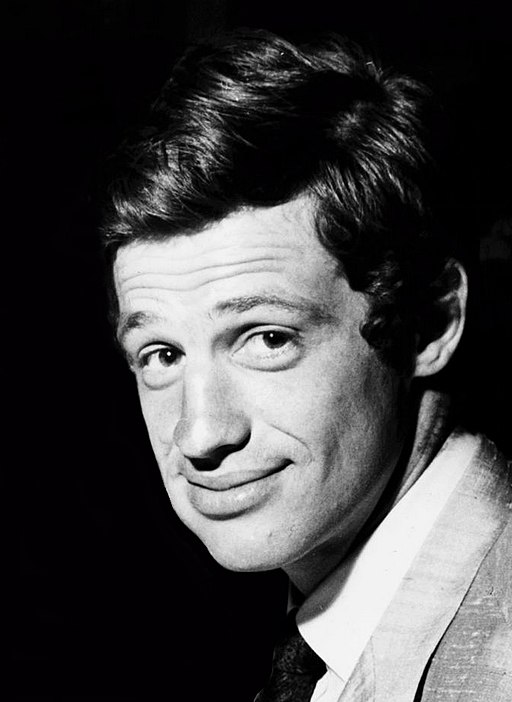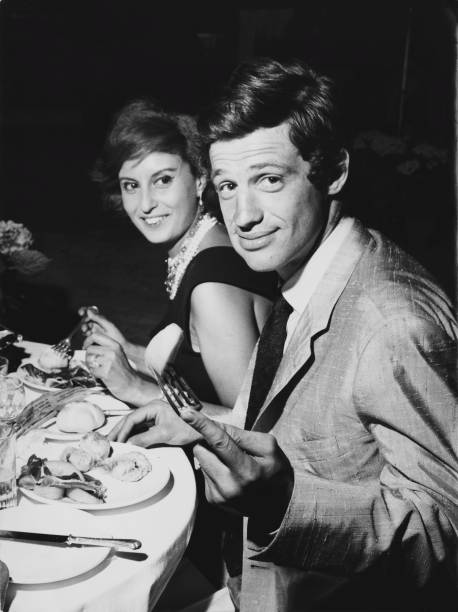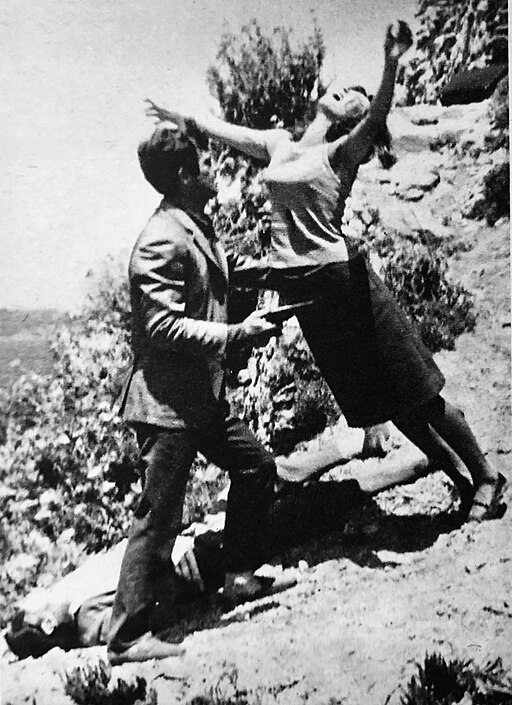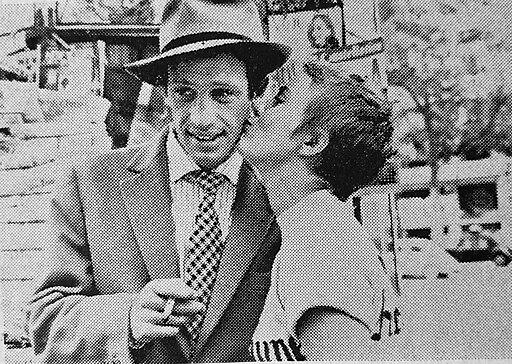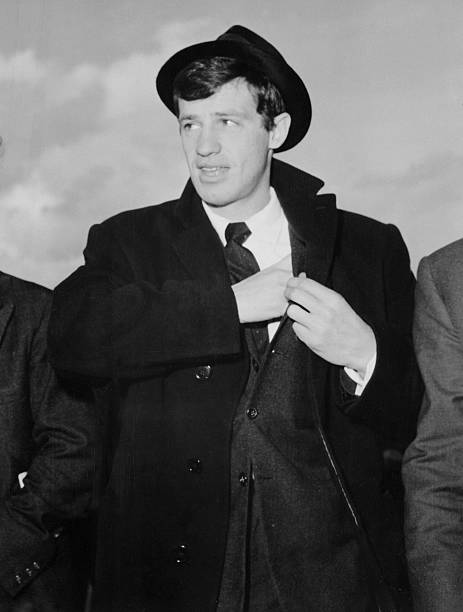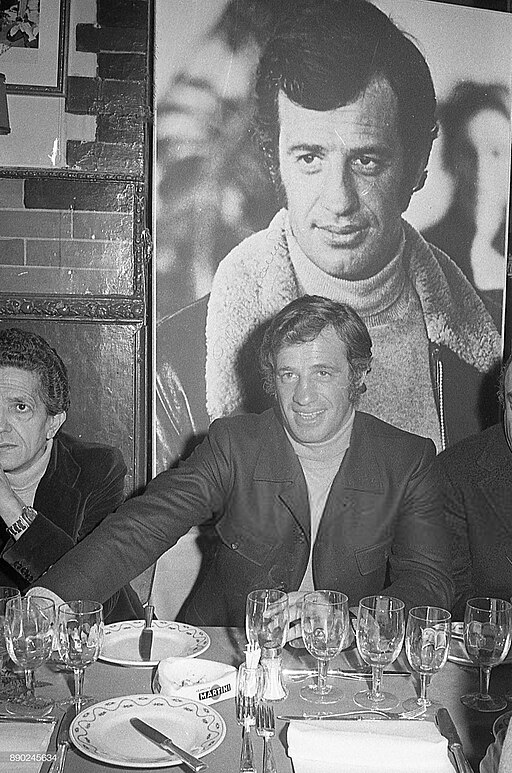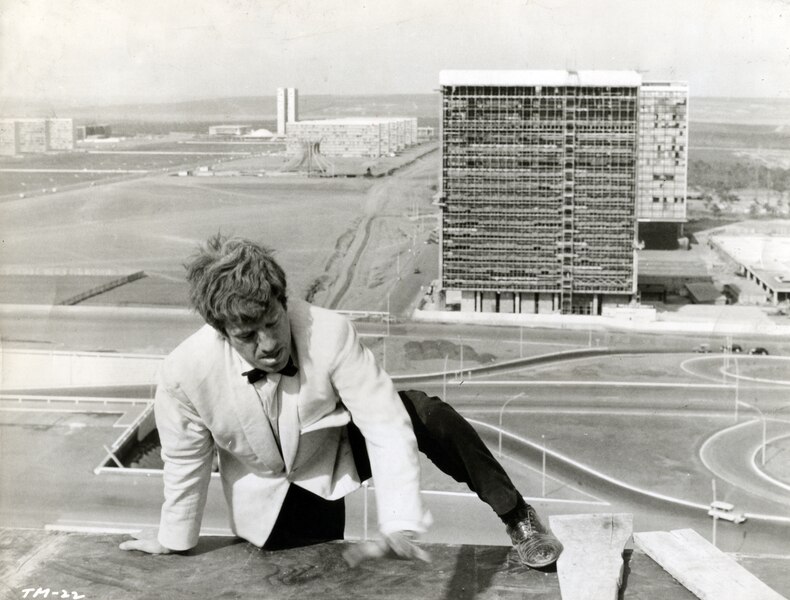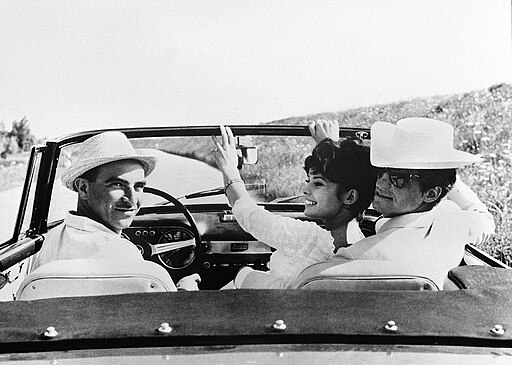Jean-Paul Belmondo
back| Full Name | Jean-Paul Charles Belmondo |
| Stage Name | Jean-Paul Belmondo |
| Born | April 9, 1933 |
| Birthplace | Neuilly-sur-Seine, France |
| Died | September 6, 2021 |
| Buried | Cimetière du Montparnasse, Paris, France |
| Married to | Élodie Constantin (1952–1965), Natty Tardivel (2002–2008) |
| Children | Patricia Belmondo (1953-1994), Florence Belmondo, Paul Belmondo, Stella Belmondo |
| Notable films | Breathless - That Man from Rio - Pierrot le Fou - Le Professionnel |
Jean-Paul Belmondo
The “Bébel” of the French New Wave scene
Jean-Paul Belmondo (1933-2021) was a renowned French actor, known for his expressive face and physical acting style. Born in Neuilly-sur-Seine, he rose to prominence in the 1960s, becoming a key figure in the French New Wave cinema.
His breakthrough role in Jean-Luc Godard's "Breathless" (1960) made him a symbol of the movement, showcasing his charm and nonconformist attitude. Belmondo's career spanned various genres from drama to comedy and action.
He was acclaimed for performances in "That Man from Rio" (1964) and "Pierrot le Fou" (1965), balancing box-office success with artistic credibility. Unlike his contemporaries, Belmondo performed many of his own stunts, adding to his rugged on-screen persona.
Off-screen, he was known for his love of sports and theater. Despite facing health issues later in life, Belmondo remained a beloved public figure in France, respected for his extensive body of work and contribution to cinema. His legacy endures as a quintessential icon of French film.
Jean-Paul Belmondo was often affectionately called "Bébel" by fans and the media. This nickname encapsulates his persona as the charming and irreverent everyman.
Related
Jean-Paul Belmondo
Biography, analysis of his performances and all his movies
Jean-Paul Belmondo was an iconic French actor, one of the leading figures of the French New Wave cinema movement. Born on April 9, 1933, in Neuilly-sur-Seine, he was the son of the renowned sculptor Paul Belmondo. Initially showing promise as a boxer, Belmondo's interests shifted to acting, and he attended the Conservatoire of Dramatic Arts in Paris.
Belmondo's breakthrough role came with Jean-Luc Godard's "Breathless" in 1960, a film that made him an international star and a symbol of the New Wave's rebellion against traditional film conventions. His screen persona as a charming and impulsive rogue endeared him to audiences and defined much of his career.
Throughout the 1960s and '70s, Belmondo successfully alternated between arthouse films and commercial action movies. His athletic performances, often doing his own stunts, earned him a reputation as a tough guy in international cinema.
Despite suffering a stroke in 2001 that temporarily paused his career, Belmondo made a comeback and continued acting until his late years. His off-screen life, including his marriages and relationships, often attracted as much attention as his film roles.
Jean-Paul Belmondo passed away on September 6, 2021. The legacy of his film work, characterized by a blend of style, humor, and rebellion, left a lasting impact on French cinema and audiences around the world.
Analysis of Jean-Paul Belmondo’s style of acting:
Jean-Paul Belmondo's acting style is synonymous with the French New Wave movement, which revolutionized cinema in the 1950s and 60s. His approach to acting was characterized by a few key elements:
Naturalism and Spontaneity
Belmondo was known for his naturalistic performance. Unlike the traditional, more theatrical style that was prevalent in the French cinema of the earlier decades, his acting felt spontaneous and unrehearsed. This spontaneity made his characters appear more real and accessible to the audience.
Charm and Charisma
Belmondo's screen presence was marked by a distinctive charm and an easy-going charisma. His smile, casual demeanor, and sometimes nonchalant attitude contributed to the creation of characters that were likable and engaging, even when they were flawed or morally ambiguous.
Physicality
A former boxer, Belmondo brought a unique physicality to his roles. He often performed his own stunts, which added an element of realism and danger to his films. His athletic ability allowed him to execute action sequences with convincing agility and strength, making him popular in action roles.
Anti-Hero Persona
Many of Belmondo's characters could be described as anti-heroes. They often lived by their own rules, exhibiting traits that went against the grain of society. His roles in films such as "Breathless" and "Pierrot le Fou" epitomize this trait, which became a hallmark of the New Wave heroes.
Versatility
Despite being strongly associated with the French New Wave, Belmondo's career was marked by versatility. He navigated between genres, starring in comedies, dramas, action movies, and even gangster films. This adaptability showcased his range as an actor and his willingness to challenge himself with diverse roles.
Collaboration with Directors
Belmondo's style was also shaped by his collaborations with some of the most distinguished directors of his time, such as Jean-Luc Godard, François Truffaut, and Louis Malle. The trust and rapport he built with these directors allowed him to experiment and push the boundaries of conventional acting.
In essence, Jean-Paul Belmondo's acting style was emblematic of a shift in cinematic storytelling, where the focus was on portraying characters with a sense of authenticity and emotional complexity, and he did so with an effortless cool that became his signature.
Notable movies featuring Jean-Paul Belmondo:
1950s:
- "À Pied, à Cheval et en Voiture" (1957): A minor role in a comedy about a man's love for his car and the various complications that ensue.
- "Les Copains du Dimanche" (1958): A film that tackles workers' rights, with Belmondo playing one of the workers.
1960s:
- "Breathless" (À bout de souffle) (1960): Belmondo's breakthrough role as a wandering criminal in Jean-Luc Godard's seminal New Wave film.
- "That Man from Rio" (L'Homme de Rio) (1964): An adventure comedy featuring Belmondo as a soldier who goes on a wild journey to save his girlfriend.
- "Pierrot le Fou" (1965): Another collaboration with Godard, with Belmondo playing a man on the run with his ex-girlfriend's baby-sitter, reflecting on life and love.
- "Le Voleur" (1967): A period drama where he plays a charismatic thief in the early 20th century.
1970s:
- "Le Cerveau" (1969): A heist comedy where Belmondo plays one of two masterminds trying to steal a train full of NATO money.
- "Borsalino" (1970): A gangster film co-starring Alain Delon, with Belmondo as one of two gangsters who rise to power in the French underworld.
- "Stavisky..." (1974): A biographical film based on the life of the notorious financier and embezzler Serge Alexandre Stavisky.
- "L'Alpagueur" (1976): An action thriller featuring Belmondo as a bounty hunter on the trail of a criminal.
1980s:
- "Le Professionnel" (1981): Belmondo stars as a secret agent seeking revenge after being betrayed by his government.
- "Le Marginal" (1983): He plays a tough police inspector determined to bring down a powerful drug lord.
1990s:
- "Itinéraire d'un Enfant Gâté" (1988): A drama about a successful businessman who fakes his own death to start over, reflecting on his life's choices.
2000s:
- "Un Homme et Son Chien" (2008): Belmondo's final film, in which he plays an elderly man who is abandoned by his family and must fend for himself and his dog.
Remarkable quotes from Jean-Paul Belmondo:
- On choosing roles: "I don't look for masterpieces. I look for films where I can have fun without any moralizing."
- On acting: "An actor is only merchandise."
- Reflecting on his work: "I've done everything. I've done the hero, the comic, the tough guy, the villain. That's what's so great about my profession - you get to do everything without sticking to one particular type of character."
- On his film choices: "I don't want to be a movie star. I want to be in movies that are stars."
- On aging: "I've had my share of successes and failures, but I have no regrets because they're part of life's richness."
- Regarding physical stunts: "I started doing stunts, and I got addicted to the adrenaline of doing my own things."
- On fame: "Fame had brought me so much unhappiness."
Analysis of Jean-Paul Belmondo’s performance in the movie “Breathless”:
Jean-Paul Belmondo's performance in "Breathless" ("À bout de souffle"), directed by Jean-Luc Godard and released in 1960, is one of the defining roles of his career and a cornerstone of French New Wave cinema. His portrayal of Michel Poiccard—an impulsive, charismatic, and ultimately tragic figure—is a study in contradiction and complexity, which is emblematic of the New Wave's break from traditional cinematic norms.
Key aspects of his performance in "Breathless" include:
Naturalism
Belmondo's acting in "Breathless" feels spontaneous and authentic, akin to the cinema verité style. His nonchalant demeanor and casual delivery contributed to a sense of realism that was innovative for the time.
Charm and Coolness
Michel is a character who, despite his moral ambiguity, is undeniably charming and cool, largely because of Belmondo's effortless charisma. He exudes a casual confidence, whether he's stealing a car or casually discussing love and life.
Physicality
Belmondo brought a distinctive physicality to the role. His expressive face, the way he smokes a cigarette, and his casual gait all contribute to a character that is as much defined by his physical presence as by his dialogue.
Homage to Classic Hollywood
The character of Michel is partly a tribute to the classic Hollywood tough-guy archetype. Belmondo's performance channels the spirit of actors like Humphrey Bogart, which Michel explicitly admires in the film. This acknowledgment of cinema's past while breaking with its stylistic conventions is a hallmark of the New Wave movement.
Anti-heroism
Michel is an anti-hero, and Belmondo captures this through a performance that makes the audience empathize with a character who is a criminal and often morally reprehensible. This complexity was a departure from the typically clear-cut heroes of previous cinematic eras.
Improvisation
Godard's direction allowed for moments of improvisation, which Belmondo embraced. His ability to be present in the moment and react naturally to his co-star, Jean Seberg, and his surroundings added a layer of unpredictability to the film.
Belmondo's Michel is both detached and passionate, a thug with a philosopher's soul, and his performance is a balancing act between these extremes. It's a testament to his skill that the character remains engaging and enigmatic, and it is a large part of why "Breathless" remains a classic of world cinema. The film and Belmondo’s performance had a significant impact on the direction of international filmmaking, influencing generations of directors and actors with its unique style and approach to character development.
Analyzing Belmondo’s role in the movie “That Man from Rio”:
"That Man from Rio" ("L'Homme de Rio") is a 1964 adventure film directed by Philippe de Broca and starring Jean-Paul Belmondo as the protagonist, Adrien Dufourquet. The film is a blend of adventure, comedy, and romance, showcasing Belmondo's versatility as an actor and his physical prowess. Here’s an analysis of Belmondo’s role in the film:
Physical Comedy and Stunts
In "That Man from Rio," Belmondo performs many of his own stunts, which adds authenticity to the action sequences. His physical comedy is reminiscent of silent film stars like Buster Keaton and Charlie Chaplin, as he executes elaborate chase scenes and comedic escapes.
Charming Hero
Belmondo's character, Adrien, is the quintessential charming hero. He's driven by love and a sense of duty, displaying both resourcefulness and wit as he embarks on a quest to rescue his girlfriend, who has been kidnapped by treasure thieves.
Romantic Lead
Even amidst the action, Belmondo maintains a strong romantic allure. His interactions with Françoise Dorléac's character are filled with playful banter and chemistry, ensuring that the romantic subplot is as engaging as the film's action.
Everyman Appeal
Belmondo's portrayal of Adrien is accessible; he's an everyman thrown into extraordinary circumstances. His ability to convey determination and vulnerability simultaneously makes the character relatable and endearing to the audience.
Energy and Pace
Throughout the film, Belmondo maintains a high level of energy that drives the fast-paced plot forward. His performance contributes to the film's overall rhythm, keeping viewers engaged and entertained.
Adaptability
Belmondo demonstrates his adaptability as an actor in "That Man from Rio." Unlike the cool, aloof characters he often portrayed in French New Wave films, here he exhibits a more traditional form of heroism, combining physicality with a lighthearted approach to danger.
The film's success is due in large part to Belmondo's ability to carry the film with both comedic and heroic gravitas. His performance in "That Man from Rio" not only showcases his range as an actor but also cements his status as one of France's most beloved stars. The film remains a classic, and Belmondo's role is remembered for its vibrant energy and adventurous spirit.
Awards and Nominations:
- Honorary César: In 1989, Belmondo was awarded an Honorary César for his contribution to French cinema.
- César Award for Best Actor: He won the César Award for Best Actor in 1989 for his role in "Itinéraire d'un enfant gâté."
- Golden Globe Award Nomination: Belmondo was nominated for a Golden Globe Award for Best Actor – Motion Picture Musical or Comedy for his performance in "That Man from Rio" (L'Homme de Rio) in 1964.
- Venice Film Festival: He won the Volpi Cup for Best Actor for his performance in "Léon Morin, Priest" (Léon Morin, prêtre) in 1961.
- David di Donatello Awards: Belmondo received the David di Donatello for Best Foreign Actor for "That Man from Rio" in 1965 and "Ace of Aces" (L'As des as) in 1983.
- Berlin International Film Festival: He received a Berlinale Camera at the Berlin International Film Festival in 1995.
- Career Achievements: Throughout the 1980s and 1990s, Belmondo was honored with various career achievement awards at film festivals around the world, recognizing his longstanding contributions to the film industry.
Additionally, in 2007, Belmondo received the Legion of Honour, which is France's highest order of merit for military and civil merits. He was promoted to Commander, which is a significant recognition by the French state.
Full list of Jean-Paul Belmondo films:
- Les copains du dimanche (1956)
- Molière (1956) [TV Movie]
- À pied, à cheval et en voiture (1957)
- Sois belle et tais-toi (1958)
- Un drôle de dimanche (1958)
- Les Tricheurs (1958)
- Charlotte et son Jules (1959) [Short]
- À double tour (1959)
- Les Distractions (1960)
- À bout de souffle (1960)
- Moderato cantabile (1960)
- La ciociara (1960)
- Lettre à mon juge (1960)
- Les Amours célèbres (1961)
- Une femme est une femme (1961)
- Léon Morin, prêtre (1961)
- La viaccia (1961)
- Un nommé La Rocca (1961)
- Les Parisiennes (1962)
- Cartouche (1962)
- Un singe en hiver (1962)
- L'aîné des Ferchaux (1963)
- Mare matto (1963)
- Dragées au poivre (1963)
- L'homme de Rio (1964)
- Échappement libre (1964)
- Week-end à Zuydcoote (1964)
- Cent mille dollars au soleil (1964)
- Pierrot le Fou (1965)
- Par un beau matin d'été (1965)
- Les Tribulations d'un Chinois en Chine (1965)
- Paris brûle-t-il? (1966)
- Tendre voyou (1966)
- Casino Royale (1967)
- Le Voleur (1967)
- Ho! (1968)
- Un homme qui me plaît (1969)
- Borsalino (1970)
- Les Mariés de l'an II (1971)
- Le Casse (1971)
- La Scoumoune (1972)
- Docteur Popaul (1972)
- L'Héritier (1973)
- Le Magnifique (1973)
- Stavisky... (1974)
- Peur sur la ville (1975)
- L'Incorrigible (1975)
- L'Alpagueur (1976)
- Le Corps de mon ennemi (1976)
- L'Animal (1977)
- Le Guignolo (1979)
- Le Professionnel (1981)
- Le Marginal (1983)
- Les Morfalous (1984)
- Hold-Up (1985)
- Le Solitaire (1987)
- Itinéraire d'un enfant gâté (1988)
- Stavisky, il grande truffatore (1992)
- L'Inconnu dans la maison (1992)
- Les Misérables (1995)
- Désiré (1996)
- Peut-être (1999)
- Amazone (2000)
- Un homme et son chien (2008)

